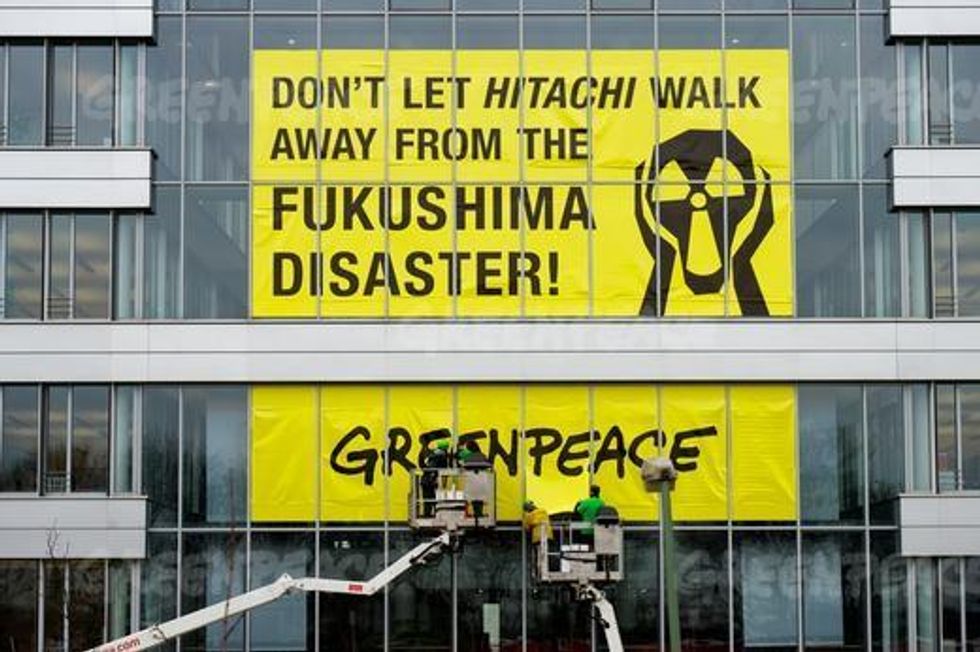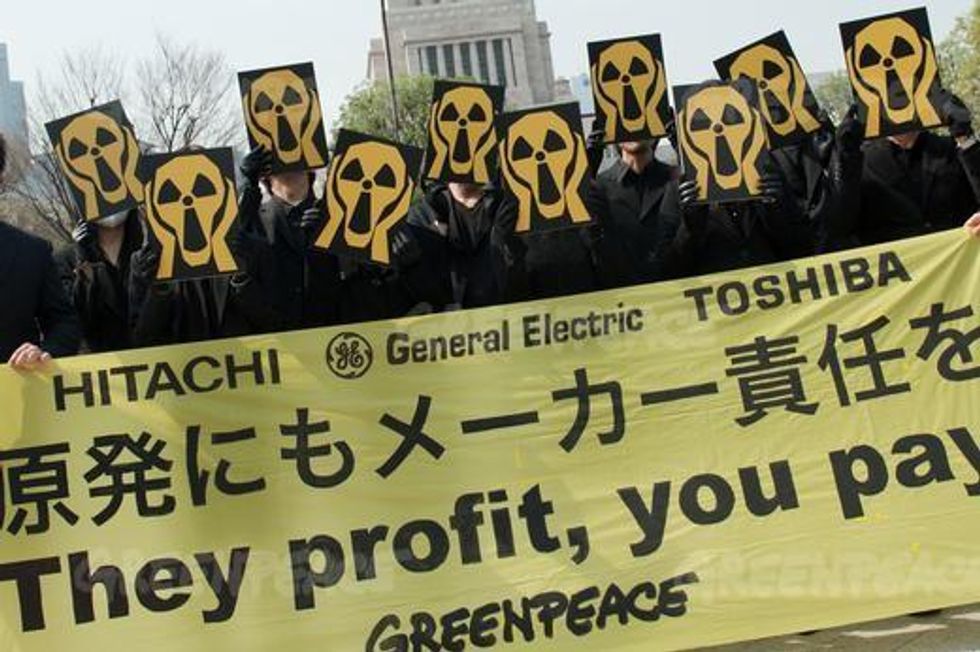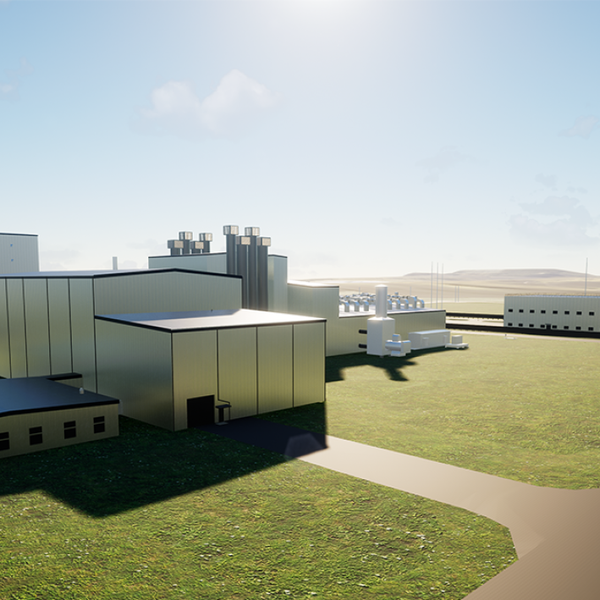'They Profit, You Pay': Activists Slam Nuclear Industry as Fukushima Remains Too Hot to Enter
At disaster-stricken Japanese plant and worldwide, the nuclear industry must be held accountable, says Greenpeace

Meanwhile, from the Fukushima Nuclear Plant today, Julian Ryall of the Telegraph reports that radiation levels within half of the reactor units are still far too high for people to enter, let alone efficiently "decommission" them, two years after the disaster began.
According to Ryall, scientists still do not have a grasp on the conditions of the reactor cores in three of the six units at the Fukushima Daiichi plant. They cannot enter the structures to investigate and are confined to using remote-controlled vehicles to get inside the "tangle of wires, pipes and rubble that has lain untouched since the tsunami tore through the facility."
Takeshi Takahashi, the head of the crippled plant, recently conceded that it will take at least 30 years before the plant could be fully decommissioned.
"Radiation levels at units one, two and three are very high and the cause of that is the fuel that has melted inside the reactors," he said.
In protest of the subsequent ongoing and adverse effects on public health and the environment--in the past, present, and likely future of nuclear catastrophes--Greenpeace activists across the world called on the nuclear industry to take responsibility for their ongoing crimes.
From demonstrations outside of the Japanese parliament, to direct action outside of GE's European headquarters in Brussels, to the unfurling of a protest banner at Hitachi Power's European HQ, activists coordinated actions across three continents to "highlight that the lack of accountability of the nuclear industry is not only a problem limited to Japan."
Greenpeace reports:
Using giant stickers, photos, projected images and nuclear scream masks, activists have already brought messages such as 'They profit, you pay' or 'Your Business, Our Risks' to the industry and the public. Activists are also demanding that GE, Hitachi and Toshiba should not be allowed to walk away from Fukushima.
Additionally, Greenpeace stated, a giant blimp with an anti-nuclear message will be seen flying across an undisclosed North American city later Thursday. More actions will be taking place in France, Germany, Belgium, Japan and North America throughout the day, following similar actions in Jordan and Switzerland that took place earlier this week.
Dr. Rianne Teule of Greenpeace International stated:
In the case of Japan, two years after the Fukushima disaster, the unfair system means hundreds of thousands of victims are still waiting for reasonable compensation for their pain, suffering and losses. They aren't getting the help they need to rebuild their lives.
It is shocking that big companies like GE, Hitachi and Toshiba, don't feel they have a moral responsibility to help people who have suffered from the radioactive contamination caused by their products. They should be made accountable for the risks they create.

_______________________
An Urgent Message From Our Co-Founder
Dear Common Dreams reader, The U.S. is on a fast track to authoritarianism like nothing I've ever seen. Meanwhile, corporate news outlets are utterly capitulating to Trump, twisting their coverage to avoid drawing his ire while lining up to stuff cash in his pockets. That's why I believe that Common Dreams is doing the best and most consequential reporting that we've ever done. Our small but mighty team is a progressive reporting powerhouse, covering the news every day that the corporate media never will. Our mission has always been simple: To inform. To inspire. And to ignite change for the common good. Now here's the key piece that I want all our readers to understand: None of this would be possible without your financial support. That's not just some fundraising cliche. It's the absolute and literal truth. We don't accept corporate advertising and never will. We don't have a paywall because we don't think people should be blocked from critical news based on their ability to pay. Everything we do is funded by the donations of readers like you. Will you donate now to help power the nonprofit, independent reporting of Common Dreams? Thank you for being a vital member of our community. Together, we can keep independent journalism alive when it’s needed most. - Craig Brown, Co-founder |
Jacob Chamberlain is a former staff writer for Common Dreams. He is the author of Migrant Justice in the Age of Removal. His website is www.jacobpchamberlain.com.

Meanwhile, from the Fukushima Nuclear Plant today, Julian Ryall of the Telegraph reports that radiation levels within half of the reactor units are still far too high for people to enter, let alone efficiently "decommission" them, two years after the disaster began.
According to Ryall, scientists still do not have a grasp on the conditions of the reactor cores in three of the six units at the Fukushima Daiichi plant. They cannot enter the structures to investigate and are confined to using remote-controlled vehicles to get inside the "tangle of wires, pipes and rubble that has lain untouched since the tsunami tore through the facility."
Takeshi Takahashi, the head of the crippled plant, recently conceded that it will take at least 30 years before the plant could be fully decommissioned.
"Radiation levels at units one, two and three are very high and the cause of that is the fuel that has melted inside the reactors," he said.
In protest of the subsequent ongoing and adverse effects on public health and the environment--in the past, present, and likely future of nuclear catastrophes--Greenpeace activists across the world called on the nuclear industry to take responsibility for their ongoing crimes.
From demonstrations outside of the Japanese parliament, to direct action outside of GE's European headquarters in Brussels, to the unfurling of a protest banner at Hitachi Power's European HQ, activists coordinated actions across three continents to "highlight that the lack of accountability of the nuclear industry is not only a problem limited to Japan."
Greenpeace reports:
Using giant stickers, photos, projected images and nuclear scream masks, activists have already brought messages such as 'They profit, you pay' or 'Your Business, Our Risks' to the industry and the public. Activists are also demanding that GE, Hitachi and Toshiba should not be allowed to walk away from Fukushima.
Additionally, Greenpeace stated, a giant blimp with an anti-nuclear message will be seen flying across an undisclosed North American city later Thursday. More actions will be taking place in France, Germany, Belgium, Japan and North America throughout the day, following similar actions in Jordan and Switzerland that took place earlier this week.
Dr. Rianne Teule of Greenpeace International stated:
In the case of Japan, two years after the Fukushima disaster, the unfair system means hundreds of thousands of victims are still waiting for reasonable compensation for their pain, suffering and losses. They aren't getting the help they need to rebuild their lives.
It is shocking that big companies like GE, Hitachi and Toshiba, don't feel they have a moral responsibility to help people who have suffered from the radioactive contamination caused by their products. They should be made accountable for the risks they create.

_______________________
Jacob Chamberlain is a former staff writer for Common Dreams. He is the author of Migrant Justice in the Age of Removal. His website is www.jacobpchamberlain.com.

Meanwhile, from the Fukushima Nuclear Plant today, Julian Ryall of the Telegraph reports that radiation levels within half of the reactor units are still far too high for people to enter, let alone efficiently "decommission" them, two years after the disaster began.
According to Ryall, scientists still do not have a grasp on the conditions of the reactor cores in three of the six units at the Fukushima Daiichi plant. They cannot enter the structures to investigate and are confined to using remote-controlled vehicles to get inside the "tangle of wires, pipes and rubble that has lain untouched since the tsunami tore through the facility."
Takeshi Takahashi, the head of the crippled plant, recently conceded that it will take at least 30 years before the plant could be fully decommissioned.
"Radiation levels at units one, two and three are very high and the cause of that is the fuel that has melted inside the reactors," he said.
In protest of the subsequent ongoing and adverse effects on public health and the environment--in the past, present, and likely future of nuclear catastrophes--Greenpeace activists across the world called on the nuclear industry to take responsibility for their ongoing crimes.
From demonstrations outside of the Japanese parliament, to direct action outside of GE's European headquarters in Brussels, to the unfurling of a protest banner at Hitachi Power's European HQ, activists coordinated actions across three continents to "highlight that the lack of accountability of the nuclear industry is not only a problem limited to Japan."
Greenpeace reports:
Using giant stickers, photos, projected images and nuclear scream masks, activists have already brought messages such as 'They profit, you pay' or 'Your Business, Our Risks' to the industry and the public. Activists are also demanding that GE, Hitachi and Toshiba should not be allowed to walk away from Fukushima.
Additionally, Greenpeace stated, a giant blimp with an anti-nuclear message will be seen flying across an undisclosed North American city later Thursday. More actions will be taking place in France, Germany, Belgium, Japan and North America throughout the day, following similar actions in Jordan and Switzerland that took place earlier this week.
Dr. Rianne Teule of Greenpeace International stated:
In the case of Japan, two years after the Fukushima disaster, the unfair system means hundreds of thousands of victims are still waiting for reasonable compensation for their pain, suffering and losses. They aren't getting the help they need to rebuild their lives.
It is shocking that big companies like GE, Hitachi and Toshiba, don't feel they have a moral responsibility to help people who have suffered from the radioactive contamination caused by their products. They should be made accountable for the risks they create.

_______________________

